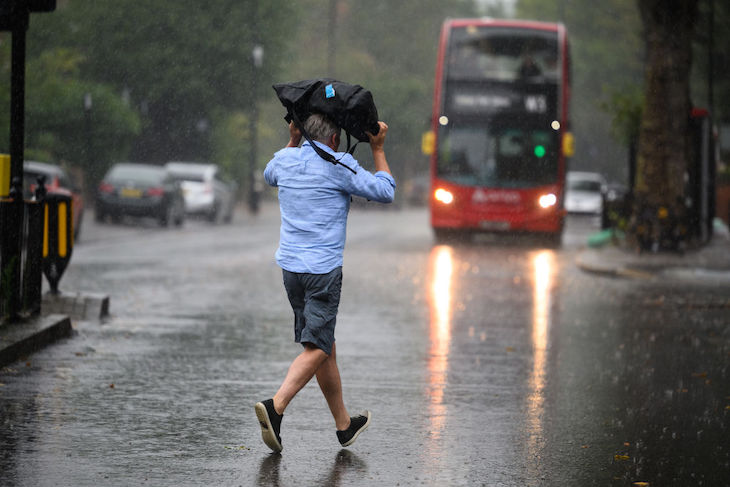Did GDP fall in July because of the wet weather? That’s the argument being made this morning, as the Office for National Statistics reveals that the economy contracted by 0.5 per cent in July, after having grown 0.5 per cent in (warm and sunny) June. Services output, production output and construction sectors all fell, by 0.5 per cent, 0.7 per cent and 0.5 per cent respectively, as the bad weather took its toll.
It stands to reason that weather did play a factor. Monthly GDP figures are sensitive to these kinds of effects, which also include disruptions like bank holidays or strikes. The impact of frequent industrial action this year has repeatedly shown up in the data, and July was no exception: the fall in services is largely attributed to the 3.4 per cent contraction in the human health activities industry, which was hit by NHS junior doctors, senior doctors and radiologists going on strike.
As with strikes, weather can move the dial: especially in areas like construction that are dependent on external conditions, and in areas like retail sales, which rise when people are keen to be out and about. But these worse than expected figures in July (the consensus was a 0.2 per cent fall) may also be a sign that 14 consecutive interest rate hikes are finally starting to kick in. Rate hikes are, after all, designed to cool the economy, and you would expect to see evidence of this not just in the inflation data, but in the growth figures, too. Capital Economics cautiously reports this morning that its prediction of a recession before the end of the year might now be underway, as July’s figures suggest that ‘underlying growth has lost momentum.’
Still, the overall narrative for the year stays the same: sluggish growth means the economy is likely to remain stagnant this year (if we’re lucky, there will be marginal growth; if we’re unlucky, there will be a shallow recession). No weather report can explain away the dreary state of the economy.
In his response to this morning’s figures, chancellor Jeremy Hunt pointed to the major GDP revision unveiled at the start of this month, which showed that the UK economy actually recovered from the pandemic crash a year and a half ago. Optimists might be inclined now to speculate about how accurate more recent figures might be. But unfortunately, that good news story is also one from the past. If the government does make good on its pledge to ‘grow the economy’ this year, it seems on track to do so merely by technicality.







Comments